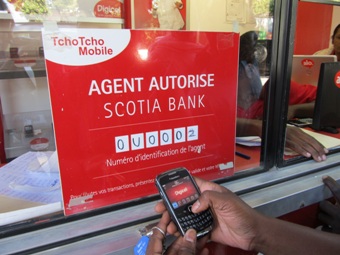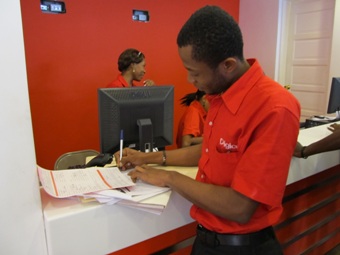Erin B. Taylor
In December 2010, both Digicel and Voilá launched mobile money services in Haiti in
a bid to win the
$2.5 million dollar prize offered by the Gates Foundation. Digicel came out on top, being the first to meet
the requirements of making 10,000 transactions (100 agents, in 100 locations doing 100 cash-in/cash-out transaction
each), and were awarded their prize on the 10th of January 2011 at a ceremony in downtown
Port-au-Prince.

Mobile banking is a promising solution to the problems that most poor Haitians face
when trying to access financial services. Last year, I worked with Dr. Espelencia
Baptiste and Dr. Heather Horst to research the movement of money and use of mobile
phones around Haiti. Working in Port-au-Prince, Cap Haitien, Jacmel and Anse-a-Pitres,
our report shows how poor Haitians face major obstacles when trying to send each other money
or conduct simple banking transactions. We identified three major obstacles to the use of financial services in Haiti for
the majority of poor residents: security, time and distance, and bureaucracy. Given
that poor Haitians get by through sharing money and other resources, often across
large distances, they find these obstacles to be very frustrating.
Knowing how woefully inadequate financial infrastructure is in Haiti, we were very
optimistic when we heard about the new mobile money services. Dr. Baptiste and I have
returned to Haiti to watch as mobile money unfolds, with the continuing input of Dr.
Horst. We want to see how people are adopting the service, what they're using it for,
and if it is helping them resolve problems they encountered when using transfer service
providers such as Western Union or public transport. We are also interested in its
long-term effects on Haiti's monetary ecologies. Does it provide economic stimulation
for the country and development benefits for the poor? What are its effects on how
Haitians form and maintain social relations?
While M-PESA has been very successful in Kenya, there is no guarantee that mobile
money will work the same way in Haiti. Infrastructure–or lack of it–could propel mobile
money to new heights of success, or render it unviable. Haitians may find creative
ways of using the technology that its developers did not anticipate. Traditional pratik relationships between traders and clients might be altered, and demands for financial
assistance might now extend to relatives who were previously considered to be too
distant to have any obligations. It will be interesting to see whether mobile money
will affect traditional face-to-face relationships or migration patterns between Port-au-Prince
and the provinces.
One month in, there are two mobile money service providers in Haiti: Digicel with
Tcho Tcho Mobile, and Voilá with Ti Cash. Digicel operates almost exclusively in Port-au-Prince,
and Voilá operate almost exclusively in the provinces. Both are trying to recruit
agents and expand their coverage as quickly as possible. There are some differences
in the services. Tcho Tcho Mobile is more difficult to sign up for as they require
the aspiring client to visit an agent in person and provide a photocopy of their identification
(if the business doesn't have a photocopier). Ti Cash is easier: clients can register
over the phone. Both currently allow money deposits, transfers, and phone credit top-ups,
but you can't yet pay bills like with M-PESA in Kenya or G-Cash in the Philippines.
Their pricing structures are fairly similar, and much cheaper than sending money by
almost any other means.
It works like this: a client finds their nearest agent by calling a number and speaking
with an operator. The client enters the agent's store and asks to top up their mobile
money account. They hand over their personal identification and the money they want
to deposit (from 25 gourde to 10,000 gourde) along with the fee – there is no visible
fee for a deposit. Fees for transfers and checking one’s balance are taken out of
the user’s account. The agent does the transaction with their own mobile phone, and
the client receives a text message saying that their account has been credited.
When a client wants to transfer money or top up their mobile credit, they call the
number provided and use their keypad to conduct the transaction. They don't have to
talk to a person: they send free SMS messages from their phone to their service provider
to conduct the transaction. A client can transfer money to any mobile phone in Haiti,
and the receiver doesn't have to be registered with the mobile money service or even
use the same mobile service network. Clients can also top up the credit of any Haitian
mobile phone. To withdraw money from a mobile money account, the receiver can go to
any agent and present their valid identification. The money doesn't have to be withdrawn
– clients can use their mobile money accounts to store money (often safer than storing
it in their homes) or save money (avoiding bank fees and slow lines).
|
|
| Signing up for Tcho Tcho Mobile |
In addition to understanding the continued efforts and challenges around moving money
within Haiti, we have started talking to some of the first users of mobile money services
in Port-au-Prince, most of whom are enthusiastic and excited about the new services.
While there are some problems with infrastructure (such as the service being down),
they don't seem to be significant compared with the many other infrastructure problems
that Haitians face in their daily lives. We are hearing that the services save time
and money, and help users overcome the bureaucratic hurdles involved in using banks
and pre-existing money transfer service providers. Over the next few months we will
be keeping watch as mobile money unfolds to take stock of its socioeconomic effects
and see how it is being creatively adapted to the needs of different people in far-flung
corners of the country.




connect with us